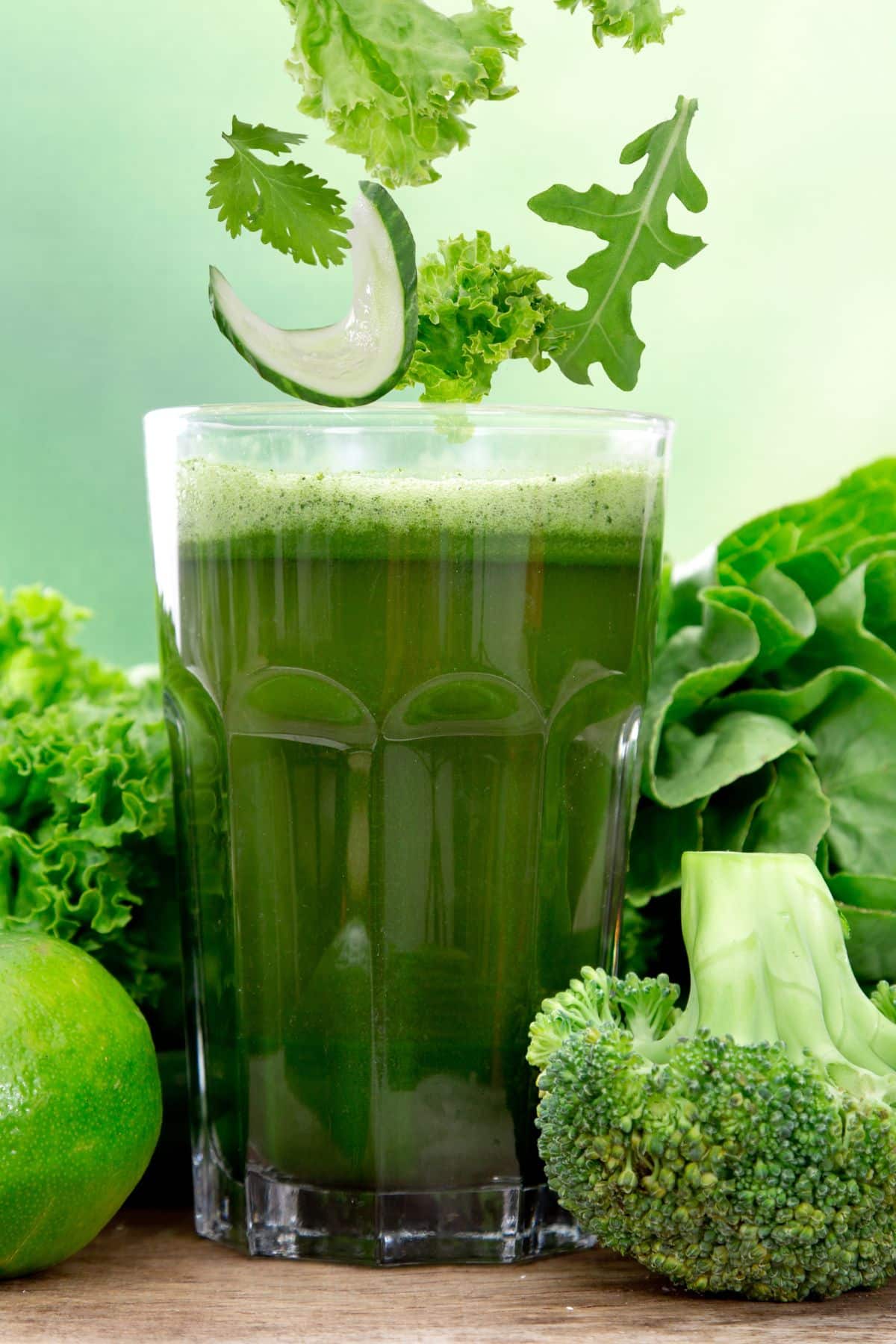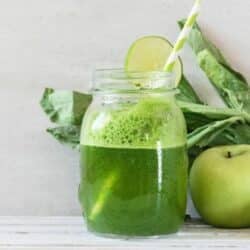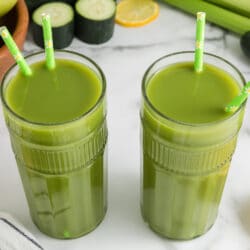10 Green Juice Benefits for Health
Green juices are made by removing the pulp from vegetables and just leaving the juice. In this article, I’ll share some of the potential health benefits of drinking green juices including their effects on the immune system, skin health, and more. Learn everything you need to know about the health benefits of green juicing.

There’s no question that green drinks including vegetable-based juices and green smoothies are here to stay!
Fresh green juice is just such a convenient way to get many of the micronutrients from veggies. Plus, when made properly with the right balance of ingredients, green drinks taste great too.
There is also certainly lots of research surrounding the beneficial nutrients from green vegetables, whether you get them from consuming the whole vegetable, or from juicing or smoothies.
Ideally, we would all be consuming at least several servings of veggies a day for gut health, essential vitamins, essential nutrients, digestive health, and overall health.
Green Juice Benefits
In this article, I’ll share 10 of the potential health benefits of green juice, understanding that you can also get these benefits from simple eating vegetables. But, for many people, juicing is the easiest way to get benefits from leafy green vegetables, especially if you have a sensitive digestive system or you don’t like the taste or texture of veggies.
If you have kidney stones, diabetes, or other serious medical conditions, you may wish to ask your doctor or healthcare provider if juice is part of a healthy diet for you.
1. Rich in Nutrients
The ingredients in green juices can vary quite a bit, but since they are usually made with super healthy veggies like kale, spinach, and Swiss chard, they are incredibly nutrient-dense.
Leafy green vegetables are generally packed with vitamins A, C, K, and folate, and are also great sources of calcium and iron. Cucumbers are nutritious, too, rich in B vitamins and minerals like potassium and magnesium.
Green veggies also provide you with a variety of antioxidants, including beta-carotene, lutein, and zeaxanthin, which can reduce oxidative stress – preventing damage to your cells and tissues – and combat inflammation.
The addition of herbs – or a little fruit for sweetness – can increase the variety of nutrients in your juice even more. Herbs have numerous health benefits and are excellent in juices (see my Parsley Juice recipe).
I have a related article on the best herbs to juice.
2. Alkalizing Effects
The idea that an alkaline diet has health benefits is a relatively new one that has gained popularity over recent years. The theory behind it is that certain foods – especially processed foods and refined sugars – can trigger your body to produce acid, which is harmful to your health.
Proponents suggest that an alkaline diet can help you avoid serious conditions like arthritis and cancer, and can also be used for weight loss.
Other suggested benefits include:
- Better bone health
- Reduced inflammation
- Higher energy levels
The medical world isn’t quite as convinced, however, and there is little research supporting these claims.
Nevertheless, this type of diet could still be considered healthy because it rules out junk foods and encourages the consumption of fruits and vegetables instead.
Green veggies have a high PH level, meaning they have an alkaline effect on the body. Green juice, therefore, would play an important role in an alkaline diet.
3. Aids Digestion
Experts have found that fresh juice contains certain compounds that can act as prebiotics.
These feed and help support the growth of the “friendly” bacteria in your gut, which are key to good digestion. It also contains fiber, a nutrient that adds bulk to the stool, encourages regular bowel movements, and prevents constipation.
That said, the juicing process removes insoluble fiber, so you won’t get as much from juice as you would from whole veggies. This is important to note, as some antioxidants are naturally bound to the fibers in vegetables and are lost once that vegetable is juiced.
On the plus side, green juice may also contain enzymes, particularly if made with avocados and ginger, or if you’ve added fruits like mangoes, kiwifruit, and banana for sweetness. Enzymes like amylase – found in mango and banana – help your body break down carbohydrates, whereas protease – found in kiwifruit – helps you digest protein.
Green juice is packed with antioxidants and compounds that reduce inflammation, too, so it can prevent inflammation in the digestive tract.
It’s also great for hydration, especially when made with water-rich veggies like celery and cucumbers. Good hydration helps foods move smoothly through the digestive tract.
Finally, green juice itself is very digestible, so it’s ideal if you’re prone to digestive issues, or have recently had stomach or intestinal surgery. See my list of the best soft foods after surgery.
I also have a recipe for Anti-Bloat Green Juice that can be really helpful to alleviate bloating.
4. Detoxification
Fans of green juice often talk about its detoxifying effects. While it may not technically detoxify the body – the liver does that! – some of the nutrients it contains are great for supporting liver health.
Its antioxidants, for example, can help neutralize the harmful free radicals that could damage liver tissues, while its anti-inflammatory properties can help prevent inflammation in the liver.
The juice itself, meanwhile, keeps you hydrated, which is very important for liver function.
I even have a Liver Cleanse Juice recipe you can try.
5. Boosts Energy
While there’s no research to support the claim, it makes sense that green juice can help you feel more energized.
It’s packed with vitamins and minerals that can provide a natural energy boost – far better than experiencing the crash associated with caffeinated beverages!
It helps you stay hydrated, preventing the fatigue caused by dehydration – and many of the nutrients it contains play important roles in energy production, particularly the B vitamins, vitamin C, iron, and magnesium.
Another bonus is that the fruits sometimes added to green juices provide natural sugars, which are fantastic as a quick source of energy. Unlike refined sugars, these provide additional nutrients and some fiber, too, so the release of energy is slower and more sustained.
See my list of the best juices for energy.
6. Supports Hydration
Adequate hydration is important, and – as you’ve already seen – it plays a role in everything from digestion to the health of your liver. But it’s not always easy to stay hydrated with water alone – many of us prefer to opt for something a little more flavorful.
Green juice can be the answer, especially when made with water-rich vegetables like celery, lettuce, and cucumber.
It makes a healthy alternative to caffeinated drinks, or those high in sugar. Plus it comes with the bonus of electrolytes like sodium and potassium, which help boost the juice’s hydrating effects.
If you’re not too keen on water-rich vegetables and your green juices tend to be more concentrated, consider diluting them with water to make them more hydrating while still enjoying their other benefits.
See my list of the best vegetables for juice.
7. Supports Immunity
Earlier I mentioned the compounds in fresh juice that can act as prebiotics. The good news is that those prebiotics are great for supporting immune function, too!
Green juice is also packed with vitamin C and other antioxidants that can help ward off colds and flu. What’s more, it contains phytochemicals – compounds produced by plants that protect them from parasites, bacteria, and viruses.
Fortunately, phytochemicals work the same way for humans, bolstering your immune system and protecting you from acute and chronic illnesses.
8. Weight Management
Green juice can be an excellent aid to weight management when consumed alongside a balanced diet.
It’s a very low-calorie source of lots of important nutrients, so it makes a great alternative to fatty or sugary snacks. Plus it contains some fiber, so it helps you stay feeling full for longer.
It keeps you hydrated, too – a key factor in weight management because it helps regulate your appetite and stops you from overeating.
Don’t miss my list of the best juices for losing weight.
9. Improves Skin Health
The wide range of antioxidants and phytochemicals in green juice are wonderful for your skin as they help neutralize the free radicals that can damage the skin’s cells and lead to premature aging.
The vitamin C in green vegetables also helps the body produce collagen, a protein that gives structure to the skin, maintains its elasticity, and keeps you looking younger.
Its high water content, meanwhile, keeps you hydrated and helps reduce the appearance of fine lines and wrinkles.
Another bonus is that green juice is free of the added sugars found in many commercially made drinks. Too much sugar can lead to a chemical reaction in your body called glycation. This weakens the collagen and elastin in your skin, leaving it dry, less elastic, and dull.
10. Enhanced Mental Clarity
Last but not least, green juice contains the important nutrients needed for brain health and function, so it improves your mental clarity. Studies have shown that a daily dose of leafy greens can lower your risk of age-related mental decline, their antioxidants helping protect the brain’s cells from oxidative stress.
Green veggies are also rich in vitamin K. This helps the body produce sphingolipids, which are essential for brain health
Hydration plays a part in mental clarity, too – it prevents fatigue and helps you concentrate.
Consider throwing a few chia or flaxseeds into your juice and you’ll also get the benefits of omega-3 fatty acids, which are important in supporting brain function.
Potential Drawbacks of Green Juice
So green juice definitely has its benefits – but there are a few drawbacks to consider, too.
1. Loss of Fiber
As mentioned earlier, juicing green vegetables removes much of their fiber.
Fiber is an important nutrient, helping maintain a healthy digestive system, regulating blood sugar levels, and keeping you feeling full for longer. This means you’ll need to eat plenty of whole vegetables alongside your green juice to ensure you’re getting the fiber you need.
2. Sugar Content
If you make your green juices with vegetables alone, the sugar content isn’t likely to be high.
But the natural sugars can shoot up by quite a bit if you add fruit too, and it can be very easy to consume more than you realize.
To avoid unwanted increases in your blood sugar levels, limit how much green juice you drink if it contains fruit. And, try to avoid plain fruit juice for the best results. Fruit juice in liquid form will increase blood sugar even more than whole fruits.
Be especially wary of store-bought green juices, as these may contain extra sugar in addition to the natural sugar already present in the fruit.
3. Cost
Store-bought green juice can be costly, but making your own can be expensive, too.
First, you’ll need a juicer. There are cheaper models around, but for efficiency, you’ll really need a centrifugal or masticating juicer.
Then, there are the ingredients. Ideally, you’ll want to use high-quality, organic produce, which comes with a high price tag.
The quantity needed has an impact, too – it can take a lot of veggies to produce a single glass of green juice.
4. Potential Contaminants
Non-organic produce – improperly cleaned – may contain contaminants or pesticide residues that may end up concentrated in your juice.
This is why it’s essential to focus on premium, organically grown ingredients, or to wash or peel inorganic produce carefully.
Green Juice Benefits FAQs
The problem with green juice is that it’s lower in fiber than whole vegetables.
Fiber helps slow down how quickly your body absorbs sugar from your digestive tract. If you don’t get enough, your blood sugar levels can spike more quickly.
Another issue is that you can easily consume too much sugar from juice without even realizing it, especially if the juice contains fruit.
This may cause you to gain weight and make it harder to regulate your blood sugar levels in the future.
I recommend speaking to your medical adviser if you have diabetes and plan to make green juice a regular part of your diet.
There is no set amount of green juice that anyone should drink daily. It depends on your preferences, your health goals, and your diet in general.
I recommend taking it easy at first and drinking no more than a cup per day, as this will give you a chance to gauge how your body reacts.
Drinking too much green juice can have adverse side effects. If you want to increase the amount you consume, I recommend checking with your healthcare provider first.
Some people believe that drinking juice on an empty stomach means you’ll absorb its nutrients more efficiently, although there’s no scientific evidence to support this.
Others suggest that the “detoxification” benefits of juice are enhanced if it’s drunk without food, but – again – there’s no research to confirm this claim.
Drinking juice with food may be better, as pairing it with proteins, fats, and carbohydrates can keep your blood sugar levels balanced. It also ensures you’ll consume the fiber that’s missing from the juice.
Green Juice Recipes to Try
Conclusions
If you struggle to eat enough vegetables, drinking green juice is a great way to get more nutrients into your diet. It can improve your health in a variety of ways, from boosting your immune system to helping manage your weight. Be sure to speak to your healthcare adviser and discuss any drawbacks before making green juice a regular part of your diet.
Don’t forget to join my newsletter list to get exclusive clean eating recipes and tips. The newsletter is 100% free with no spam; unsubscribe anytime.
About the Author: Carrie Forrest has a master’s degree in public health with a specialty in nutrition and is a certified holistic nutritionist. She is a top wellness and food blogger with over 5 million annual visitors to her site. Carrie has an incredible story of recovery from chronic illness and is passionate about helping other women transform their health. Send her a message through her contact form.
Note: this post is for informational purposes only and is not intended as medical advice. Please consult your healthcare provider for recommendations related to your individual situation.




















